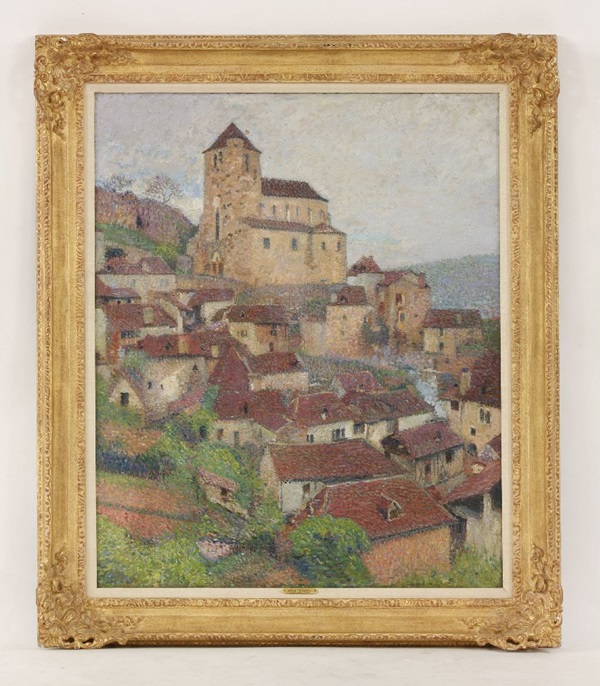
A painting by French Impressionist Henri Jean Guillaume Martin, which was stolen three years ago and recovered this past November, was put up at auction in the UK yesterday. But the price it realized, £80,000 at hammer ($111,000), just scraped the low end of the £80–100,000 estimate, at Sworders Fine Art Auctioneers, an auction house known more for its sales of silver, jewelry, and fine wine than for its paintings. Only a few years ago, the same work sold at Christie’s New York for $230,500.
Was it the painting’s history that caused buyers to turn cold toward the work at auction?
Here’s the story. In 2011, the work, Vue General de Saint Cirq Lapopie (circa 1930), sold at Christie’s New York for $230,500 surpassing its high estimate of $200,000. The following year, the work was stolen from a private residence in Hertfordshire county in southern England.
Record of 2011 Christie’s sale in artnet Price Database
Photo: Courtesy artnet
In 2013, London-based Art Recovery International was tipped off that the work was being offered for sale in Canada and notified the Three Rivers police department, which presides over Hertfordshire, which kicked off an investigation with regard to this and several other works. It then turned over its relevant case files to the police and cooperated with their investigation.
In November 2014, a London dealer contacted ArtClaim—a database of stolen, missing, and looted works that is part of Art Recovery—with a question about a painting he had purchased from a “picker” (someone who scouts antique and estate sales in search of bargains).
It had been hanging in his office when a visitor recognized it from a theft notice in the Antiques Trade Gazette and advised the dealer to enlist professional due diligence services. The dealer searched the ArtClaim database and found that the painting matched the report on file.
With the dealer’s cooperation, Art Recovery sought clearance from the police to take possession of the painting. Art Recovery got confirmation that the painting was no longer subject to an active police investigation, then took possession of the the painting on behalf of the insurance company—which held the rights to recover it (presumably as a result of paying a claim to the Hertfordshire owner it was stolen from).
“Successful recoveries are often contingent on two things: patience and co-operation,” said Alice Farren-Bradley, the director of Art Recovery’s division of recoveries and claims. “Too many cases are obstructed by parties that are unwilling to share information or step forward when they have a concern. This case demonstrates the effectiveness of collaboration with law enforcement and the art museum in recovering stolen works of art.”
For the insurer, who presumably shelled out a claim sum closer to the fair market value of the work ($230,500), the financial ending, with the sale at Sworders, as part of the auction house’s “Spring Country House Sale,” was perhaps less happy.
Art Recovery spokesperson Jerome Hasler, who listened in on the sale’s audio feed, said there didn’t appear to be much activity at the smaller house. The Martin was the only lot to sell above £40,000.
“We’re pleased the case is resolved,” he said, “and the work sold with clear title.”